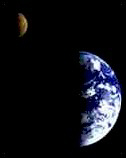Okay.
I'm a caver. I like caves. I like crawling in caves. I like mud, water, and the lack of light.
Here are a couple of books that revolve around caving, yet more importantly, around the fringes of biological research. The definition of life, my friends, in the last decade, has begun to shift drastically, right here, on Earth. Who needs other planets? Sure, science fiction writers have been creating life in methane, underwater, in the vaccuum of space, for decades, however, If you want to know where the future of biology lies today, it's within these books.
These two books talk about life in weird places, glacial ice sheets, ocean vents, hydrothermal pools, and my favorite, caves. The coined term is "extremophile life". Life can exist without oxygen, without light, with heat, without heat, in PH's in the negatives, hibernate for decades, centuries, millenia. So far, the only thing in common with all the living discoveries over the last few decades is: <drum roll> water. Perhaps one day thart rule will be broken too.
I was lucky enough to see up close and personal one of these environments in a cave in Mexico. A sulphur cave. With H2S gas bubbling out of springs. With CO2 and CO spiking and dropping O2 levels below 9% When H2SO4 drips from some of the formations (look-up snottites, pictures here: [url]http://www.i-pi.com/~diana/slime/villaluz/[/url] or here [url]http://www.nasa.gov/vision/universe/solarsystem/cave_slime.html[/url]), it burns through clothing in seconds. The sweat from your skin can react with the H2S gas and form the acid on your skin. To enter the cave, a gas mask is needed at a certain point, and at a second point, oxygen tanks and Tyvek suits. Within this cave, life doesn't just survive, it flourishes. Bacteria, insects, bats, fish. There's an entire ecosystem built independently of the outside world, independent of the sun. Reasearch done in this cave is being used in devising equipment to test for life on other planets, namely Mars.
The only thing that really restricts our definition of life, in my mind, is our imagination, and that is where scientists and science fiction writers can come together. There is no future but the present.
